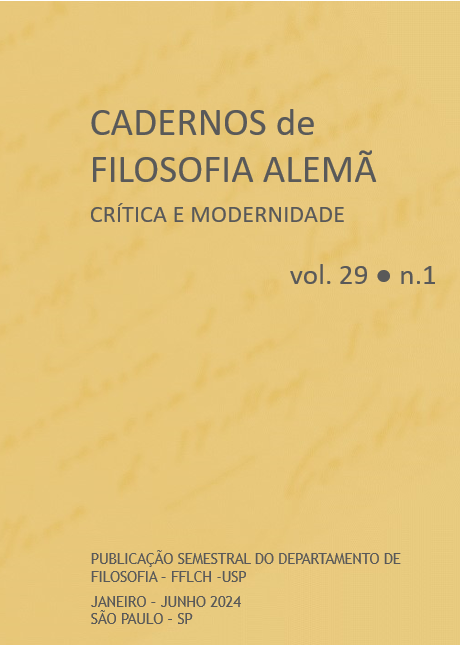From Gestell to Deep Ecology: resonances of Martin Heidegger's thought in the contemporary ecophilosophical scenario
DOI:
https://doi.org/10.11606/issn.2318-9800.v29i1p.31-46Keywords:
Gestell, technique, ecosophy, deep ecology, earthAbstract
The article discusses the impact of Martin Heidegger's (1889-1976) late thinking on the general lines of current ecological thought, which, in theory, would come close to the German author's criticism of the Gestell phenomenon. In fact, although in some aspects it is close and in others it distances itself from Heidegger's original project, this discussion resonates with some contemporary authors, such as Michel Maffesoli and Félix Guattari. In this sense, the work aims to demonstrate the extent to which Heidegger's criticism of the Gestell phenomenon has repercussions on this sphere of activity of Ecosophy, which, in general terms, seeks to rescue a multidimensional relationship (aesthetic-political-social-environmental) between the human being and the natural eco (oikos).
Downloads
References
Borges-Duarte, I. (2019). Arte e Técnica em Heidegger. Rio de Janeiro: Via Verita.
Casanova. M. A. (2006). Nada a Caminho: Impessoalidade, niilismo e técnica na obra de Martin Heidegger. Rio de Janeiro: Ed. Forense.
Catoggio, Leandro. (2010). La amarga tensión de la perseverancia. Notas acerca de la “decisión” em los Beiträge zur Philosophie. In: Decir el abismo. Lecturas de Heidegger y su obra en la década del ‘30. Dina Picotti. Org. Leandro Catoggio y Diego Parente. Mar del Plata: EUDEM.
Deleuze, G, Guattari, F. (1995). Mil Platôs: Capitalismo e esquizofrenia 2. Rio de Janeiro: Editora 34.
Guattari, F. (1990). As três ecologias. Tradução Maria Cristina F. Bittencourt. Campinas, SP: Papirus.
Guattari, F. (1992). Caosmose: um novo paradigma estético. São Paulo: Editora 34.
Guattari, F. (1993). Entrevistas (realizadas e gravadas na PUC-SP, em 21 de outubro de 1991) concedidas ao Núcleo de Estudos e Pesquisas da Subjetividade do Programa de Estudos Pós-Graduados em Psicologia Clínica da PUC-SP, 1, pp. 9-34.
Heidegger, M. (1976). [GA 02] Sein und Zeit. Frankfurt: Série. Ed. Klostermann.
Heidegger, M. (1976). [GA 09] Wegmarken. Frankfurt: Série. Ed. Klostermann.
Heidegger, M. (1977). [GA 65] Beiträge zur Philosophie (Vom Ereignis). Frankfurt: Série. Ed. Klostermann.
Heidegger, M. (1987). [GA 56/57] Zur Bestimmung der Philosophie. Frankfurt : Série. Ed. Klostermann.
Heidegger, M. (1996) L’Expérience de la pensée. In: Question III. Paris: Gallimard.
Heidegger, M. (1997) [GA 66] Besinnung. Frankfurt. Série. Ed. Klostermann.
Heidegger, M. (1999). O princípio do fundamento. Lisboa: Piaget.
Heidegger, M. (2002). [GA 08] Was Heißt Denken? Frankfurt: Série. Ed. Klostermann.
Heidegger, M. (2009). Ser e Tempo. Petrópolis, RJ: Vozes.
Heidegger, M. (2010). Meditação. Petrópolis, RJ: Vozes.
Heidegger, M. (2012). A essência da liberdade humana. Introdução à filosofia. Rio de Janeiro: Via Verita.
Heidegger, M. (2012). A questão da técnica. In: Ensaios e conferências. Trad. Márcia Schuback. Petrópolis, RJ: Vozes.
Heidegger, M. (2012). Bremen and Freiburg Lectures. Translated: Andrew J. Mitchell. Bloomington, Indiana: Indiana University Press.
Heidegger, M. (2012). A superação da metafísica. In: Ensaios e conferências. Trad. Márcia Schuback. Petrópolis, RJ: Vozes.
Heidegger, M. (2014). A origem da obra de Arte. In: Caminhos de Floresta. Lisboa. 3ª Ed. Fundação Calouste Gulbenkian.
Heidegger, M. (2015). Contribuições à filosofia: do acontecimento apropriador. Rio de Janeiro: Via Verita.
Lyra. E. (2014). A atualidade da Gestell heideggeriana ou a alegoria do armazém. Colóquios filosóficos da FAJE. Heidegger: A Questão da Verdade do Ser e sua Incidência no Conjunto do seu Pensamento. Belo Horizonte/MG, pp. 1-20. Recuperado de: https://clareira.com.br/?p=153 Acesso: 02/11/2023.
Moreira Lima, V. (2021). A Caosmose de Félix Guattari: paradigma estético, criação política e filosofia. Revista Trágica: estudos de filosofia da imanência. Rio de Janeiro, 14(2), pp. 91-120. Recuperado de: https://revistas.ufrj.br/index.php/tragica/article/view/37284 (acesso: 11/10/2022).
Maffesoli, M. (1998). Elogio da razão sensível. Petrópolis, RJ: Vozes.
Maffesoli, M. (2009). A república dos bons sentimentos: documento. Tradução de Ana Goldberger. São Paulo: Iluminuras: Itaú Cultural.
Maffesoli, M. (2010). Saturação. São Paulo: Iluminuras: Itaú Cultural.
Maffesoli, M. (2015). “La question de la technique” de Martin Heidegger. Sociétés, 129(3), p. 11-15. DOI: https://doi.org/10.3917/soc.129.0011
Maffesoli, M. (2017). Ecosophy: Wisdom Common Home. Revista: Famecos. Tradução: Simone Ceré. Porto Alegre, 24(1), pp. 1-12. DOI: http://dx.doi.org/10.15448/1980-3729.2017.1.24007.
Maffesoli, M. (2018). Pactos emocionais: reflexões em torno da moral, da ética e da deontologia. Tradução: Eduardo Portanova Barros. Curitiba: PUCPRESS.
Melo Da Silva, D. (2019). A ecosofia de Michel Maffesoli e suas implicações tecnocomunicacionais. Revista Mídia e Cotidiano, 13, p. 70-88. DOI: https://doi.org/10.22409/ppgmc.v13i2.29088.
Pelbart, P. P. (1993). Um direito ao silêncio. Cadernos de Subjetividade, 1. pp. 41-48. Recuperado de: https://cadernosdesubjetividade.files.wordpress.com/2013/09/cadernossubjetividade-1-guattari-1993.pdf acesso: 20/10/22.
Downloads
Published
Issue
Section
License
Copyright (c) 2024 Gilvanio Moreira

This work is licensed under a Creative Commons Attribution-NoDerivatives 4.0 International License.
Information and conceptions on the texts are complete responsibility of the authors.
All the articles submitted before July 5th 2018 and those published after July 2021 are licensed under a CC BY-NC-ND license – except those published between the aforementioned dates, which are under the CC BY-NC-SA license. The permission for the translation of the material published under the license CC BY-NC-ND by third parts can be obtained with the consent of the author.
Open access policies - Diadorim
Rules applied before July 5th 2018:
Presenting a submission to our Editorial Board implies granting priority of publication for “Cadernos de filosofia alemã”, as well as transferring the copyright of texts (once published), which will be reproduced only with the manifest authorization of the editors. Authors keep the right to reuse the texts published in future editions of their work, without paying any fees to "Cadernos”. We will not grant the permission to re-edit or translate the texts for third parts without agreement of the author.


